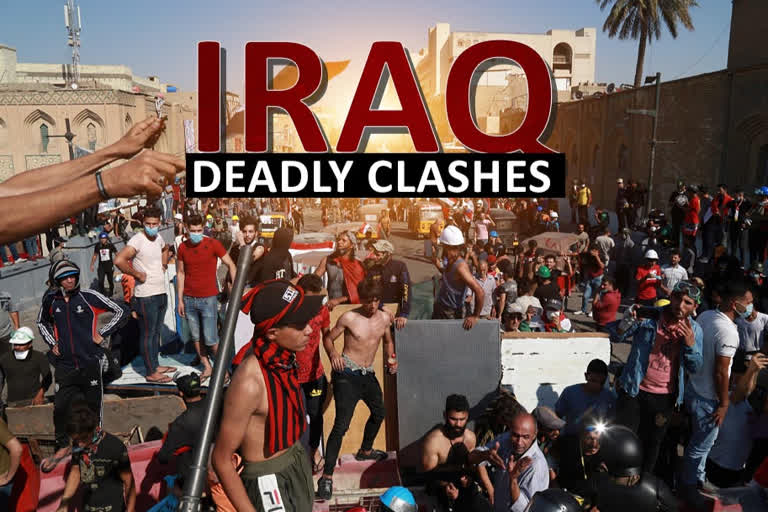Baghdad: Iraqi security forces killed six anti-government protesters and wounded more than 100 others on Saturday pushing them back from three flashpoint bridges in central Baghdad.
Five of the protesters were killed by live ammunition while the sixth died after being shot in the head with a tear gas canister. The Iraqi officials spoke on condition of anonymity in line with regulations.
The current cycle of anti-government protests and the heavy-handed security crackdown has left more than 250 people dead. Mass protests erupted in Baghdad and across southern Iraq last month calling for the overhaul of the political system established after the 2003 U.S.-led invasion.
The deaths occurred on Saturday as the protests intensified in the afternoon when demonstrators tried to reach the three bridges spanning the Tigris River to the heavily fortified Green Zone, the seat of government. Protesters have tried to force their way across on an almost daily basis.
Read More: New military pullback begins in eastern Ukraine
The protesters were pushed from the Sinak bridge to the nearby Khilani square where 35 people were wounded, according to medical officials. Security forces also regained control of the nearby Ahrar and Shuhada bridges.
The day before, authorities found a bomb under the Sinak bridge and carried out a controlled explosion of it.
In the southern city of Basra, three more protesters were killed overnight raising the death toll there to eight since Thursday. Clashes with security forces also wounded 10 people in other parts of southern Iraq including the city of Nasiriyah.
The demonstrators complain of widespread corruption, lack of job opportunities and poor basic services including regular power cuts, despite Iraq's vast oil reserves. They have rejected government proposals for limited economic reforms and instead called on the country's political leadership to resign including Prime Minister Adel Abdul-Mahdi.
Read Also: Trump to release transcript of a second call with Zelensky next week
"We consider the peaceful protests of our people as among the most important events since 2003," Abdul-Mahdi said in a statement on Saturday that vowed to meet the protesters' demands for wide-ranging reforms. He added that electoral reforms would be put forward soon along with an important government reshuffle in response to the protests against the sectarian system imposed in 2003, though the statement didn't provide further details.
Iraq's top Shiite cleric Grand Ayatollah Ali al-Sistani released a statement saying his office was not part of a deal reportedly reached to keep the prime minister in his post and put an end to the protests. Al-Sistani's office said the government should respond to protesters' demands, adding that the cleric's name was being used for political exploitation.
In al-Sistani's Friday sermon which was delivered by his representative Abdul Mahdi al-Karbalai, the top cleric said it is the responsibility of the security forces to ensure protests are peaceful and to avoid using excessive force against the demonstrators.
The prime minister also acknowledged on Saturday that the government has been blocking access to the internet.
Shortly after the statement's release, the internet on cellphones resumed for half an hour before being cut again.
Netblocks, a group that monitors worldwide internet access reported a major shutdown by Iraqi authorities as of Monday with usage in Baghdad and southern Iraq dropping to 19% of normal levels. It said the internet was partially restored early Tuesday, but that some networks are still offline and social media and messaging apps remain blocked or degraded.
Authorities shut down internet access and blocked social media sites several times during the protests in October, but Netblocks said the latest shutdown was the most severe yet.
Read Also: Australian wildfires ease, but likely to worsen on Tuesday



